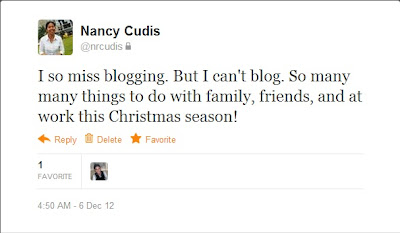My journey from print journalism to blogging starting four years ago has been a sort of whirlwind love-hate experience. Well, my original exposure has been fraught with pyramids, upside and otherwise, filled with strict instructions on pattern, proper transitions, and words that are big on impact (or at least with strong force enough to send subjects to act, hide, and/or complain). Then, by some force of nature backed up with a sense of curiosity tempered with the eagerness to learn, I started blogging.
For some time, I was in a mental pain—oftentimes grimacing at the sight of wrong spellings, wincing at poorly structured sentences, shaking my head countless times over the potential of some blog posts gone somehow wrong, and coming into terms with how many blogs have digressed from the writing rules I have learned in school and kept in my heart. Knowing my own grammar is certainly far from perfect, I stumped down the teacher in me who wants to point out these mistakes and told myself to let these pass. For me, the fact that many bloggers are regularly writing is a favorable indicator that they will improve.
Between the period I started to blog seriously and now, I won an award, which propelled me head on into the local blogging scene. I was hesitant at first; I felt that since my education about web development and Internet marketing is very inadequate, I was not really a blogger in the full sense of the term. Even up to now, while trying to stumble my way through the vacillations of online trends, I consider myself, above all, just a writer, continuously wanting to improve. In this tech-dazed time, having basic technical knowledge in blogging is a bonus. Because of this, I would tend to shy away from invitations to be a speaker or a panelist. My public speaking jitters are so hopeless.
So far, I have only really spoken before a crowd thrice this past year. The first one was during the Social Good SummitCebu at MarceloFernanCebuPressCenterin September last year, and I have so nervous I had to read my two-page speech. Part of the speech went like this:
“At the end of the day, my blog is not about me. It’s about how I am doing with my goals. Am I inspiring change through blogging and social media? Am I getting other people to really appreciate and understand Philippine literature? I don’t have a monitoring tool like radian6 for me to know. But with comments received, with conversations made, and relationships built, I want to think I’m making small steps—small but moving forward.
You remember I told you I was a Jughead before? Now I’m bent on making an impact, on inspiring change, by being diligent and patient and passionate in blogging and social media, quite an opposite of Jughead. And you know, you could do it, too. Blog with a purpose. Do social media for a good cause. Act now.”
My second exposure was in a poetry reading last December. The third one was as a panelist during the Cebuanas on the Web Meet-up last Saturday at Location63. It was organized by Google Business Group and JCI Womandaue. Notwithstanding another set of unwelcome jitters, the good thing that happened before the event was it gave me a good opportunity to learn more about the situation of women in the area of technology. Most of what I found painted a bleak yet not totally hopeless picture. ![]() |
| Cebuanas on the Web Meet-up at Location 63 |
There are stories of women who made tech innovations in their companies, were lauded and recognized, and went on maternity leave only to come back having been demoted or their projects taken advantage of. While sexism is pretty much alive in a workplace perceived to be dominated by men, many women in the underdeveloped economies are still bewildered by the mere presence of computers mainly for cultural reasons. In other parts of the world, we also read of stories of how there is a decline in terms of women population for senior technology-related positions only to be countered by comments coming from women themselves that women are leaving corporate positions to build their own start-ups. Well, I would like to think this is the case. And I would like to believe that there are more women in tech industries today than there has been 10 years ago.
![]() |
| Break and networking. Here, I pose with Hannah Amora and Iren Licera. |
![]() |
| My turn to speak (Photo by JKAR Photography) |
During the Cebuanas (women from Cebu, Philippines) on the Web event, the panelists—there were four of us—were asked how women in our respective fields are making waves and accomplishing things Cebuanas should know of. I cited the event’s keynote speaker, Hannah Amora, whose inspiring story manifests how her dedicate to her cause has transformed the lives of her family for the better. She put up Maven’s Heart Fund to raise Php 1 million in three months for her son’s surgery. I also cited Fleire Castro of Third Team Media and organizer of Google Business Group Cebu who balances one hell of an act as a digital entrepreneur, wife, mother, and teacher to her home-schooled son. In the field of journalism, I cited my former professor, Mayette Tabada, also a columnist for Sun.Star Cebu, who inspires me to be a better writer. She is what I would consider my mentor, but I’m not sure she knows that. I pointed out to the participants that many women are making waves and accomplishing many things. All we need to do is ask and network.
![]() |
| The speakers and panelists of Cebuanas on the Web Meet-up (Photo by JKAR Photography) |
The Cebuanas on the Web Meet-up was, for me, successful, what with the humor and dynamic interaction during the event, and I would like to congratulate Fleire and her team for another milestone.
(And as I end this post, I expressed to Fleire my hope that there will be a sequel of the event but of much grander scale, such as the Women in the Web Philippines.)
So all these that I have been saying are meant to draw a picture of how women are capable to be in tech jobs. Take me, for instance, who started with rigid print journalism training to become someone who is now into blogging as a hobby and digital management for a huge foundation as a full-time job. If given equal opportunities and treated as counterparts, women can do what man can, and that includes information technology and digital entrepreneurship.
Nancy

























































